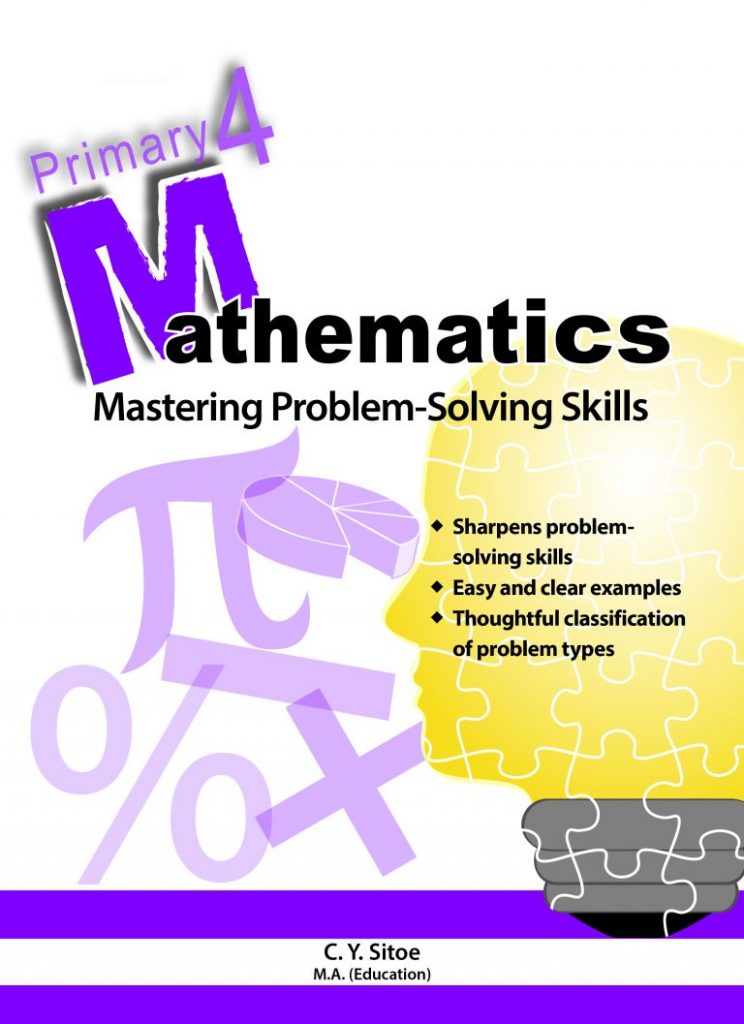Sunny Sitoe is a former primary school teacher with more than 10 years of teaching experience. His teaching philosophy centres on helping his students to develop a positive mindset towards learning Mathematics and imparting a passion for the subject. From this philosophy, C. Y. Sitoe has taught many students to love and excel in Mathematics.
Sunny is the author of Primary 4 Mathematics Mastering Problem Solving Skills. This book aims to stimulate young minds and sharpen their problem-solving skills using different approaches.
This book contains:
- Different types of heuristic word problem sums that students face.
- Easy and clear guides to help students to understand problem sums.
- Thoughtful classifications to help students to recognise commonalities among some seemingly different problem sums.
Today, Sunny shares with us on how he helps his students to build confidence when they learn Mathematics, using the scaffolding learning method.
About Your Book

1. How will this book help students to master Mathematics effectively?
There are structured scaffoldings to help the students move from one level to the next. Scaffolding is a teaching process where the teacher demonstrates how to solve a problem, and then let the students try to solve the problem on their own before giving further assistance as required.
2. Can you share some worries that students have regarding heuristic word problems?
Students typically have this perception that heuristic word problems are difficult and beyond their ability to solve.
3. What are some mistakes that students frequently make when solving problem sums?
They tend to think that there is only one method to solving problem sums. Another common mistake is that they misunderstand or misread the questions. Sometimes, they cannot comprehend the question.
4. Is there a ‘best method’ for solving problem sums effectively?
Unfortunately, there is no best method or shortcut to the process. Students need to practise as much as possible.
5. What skills should students improve on or acquire, in order to solve problem sums easily?
Students have to develop a strong foundation for the topic. A strong command of the English language also helps students to enhance their understanding of the questions.
6. How would you encourage students to not be intimidated by difficult problem sums?
Start off with baby steps by letting students tackle easier sums first. Get the students to build up their confidence and interest for Mathematics before moving on to more difficult problem sums.
7. Some parents also find problem sums difficult to solve. What advice would you have for them?
Parents should co-learn with their children so that they will better understand the road blocks that their children face.
About Yourself/Work/Expertise
1. Can you share how Mathematics has evolved as a subject over the last ten years?
Mathematics is no longer a one-method-to-answer subject. The questions asked are also trickier in terms of word choice, which tests the students’ understanding of the questions.
2. Are the present-day skills required to perform well in Mathematics different from the past?
The current questions are more application-based, where students are required to understand the concept, analyse what the question is asking for, and then decide which method to use to best solve for the answer.
3. How can students stay positive when faced with challenging Mathematics questions?
Students should focus on achieving small successes in a continuous manner in order to stay motivated and positive. The difficulty level should be progressive, with structured scaffolding to assist students in moving from one level to the next.
4. Can you share some of your ‘trade secrets’ in making students love and excel in Mathematics?
I demonstrate how Mathematics is important by using real-life examples which the students have experienced before, so they can better relate and connect the concepts to situations that they encounter in life.
5. Having taught for more than a decade, which Mathematics topic(s) do you find that students fear the most?
I noticed students are most apprehensive about Fraction, Circles, Percentage, Decimals and Geometrical topics like angles, nets, etc.
6. What advice would you give to students, especially as they move from Primary 3 to 4 when they have to start gearing their focus towards PSLE?
As with other subjects and topics, students should work on reinforcing their foundation in Mathematics, as they move progressively from easy to more challenging questions.
Developing a strong Mathematics foundation is crucial when they start learning Upper Primary Mathematics, because it will help them when the topics get deeper and more challenging.
